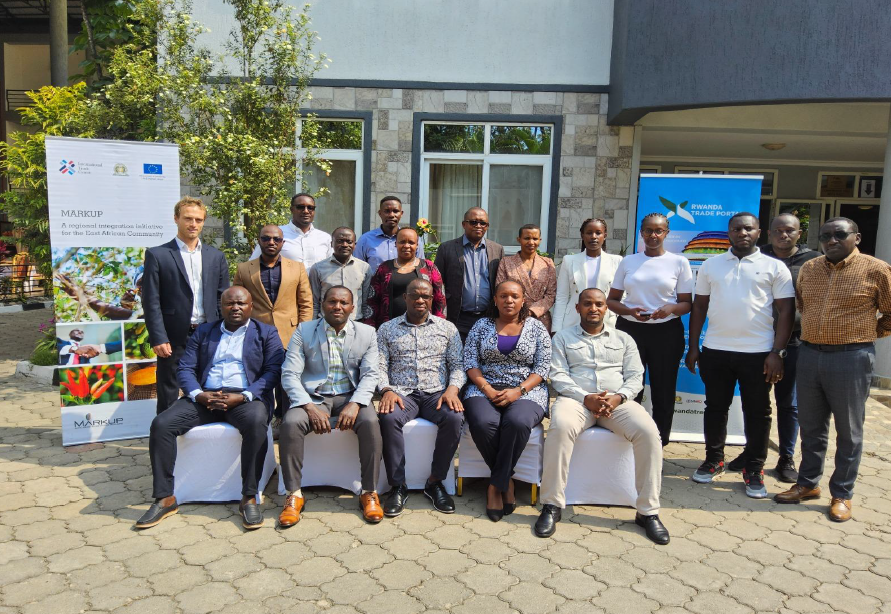How Is Rwanda Accelerating Export Reforms to Support Small Businesses and Drive Growth?
Streamlining border procedures and simplifying export formalities under European Union (EU) funded EU-EAC MARKUP II
As Rwanda makes major strides in improving its trade environment for small exporters—particularly in sectors such as coffee, avocado, and horticulture—the National Agricultural Export Development Board (NAEB) has launched new initiatives to simplify export formalities.
“Simplifying and digitalizing our export procedures is part of NAEB’s broader commitment to improving services to traders and strengthening Rwanda’s export competitiveness,” said Mr. Eric Ruganintwali, Planning Division Manager at NAEB.
“With International Trade Centre’s technical support through the European Union funded EU-EAC MARKUP II programme, we have upgraded the online export services to make it much easier and more affordable for coffee and tea exporters—especially SMEs—to access essential documents. They can now do so through the NAEB Online Export System (OES), a key feature of Rwanda’s One Stop Center services. Our next milestone is to deepen integration with other key trade agencies to provide even faster, more efficient services to all agricultural exporters”

What are the new measures?
Several key measures are now in place, making trade easier for small businesses:
-
Licensing and regulatory burden reduced:Export licenses issued by national quality infrastructure (NQI) institutions—such as Rwanda FDA, RICA, and RSB—are no longer required for most products unless mandated by the importing country. Additionally, licenses issued by these institutions are now valid for five years.
-
Risk-based import controls introduced:Import permits are now limited to high-risk goods, easing the administrative workload for compliant businesses.
-
Pro-business fee structure adopted:Service fees for SMEs have been waived, and those for larger enterprises are now capped to ensure fairness and affordability.
Reforms at NAEB
Significant reforms have also been enacted at NAEB, particularly for coffee exports:
-
The $100 fee for the Coffee Export License has been eliminated.
-
The requirement to submit a business plan, proof of site address, and rental contract has been removed—simplifying the application process.
-
Exporters are now required only to submit a contract with coffee suppliers, ensuring practical verification of value chain relationships.
-
Exporters can apply online for the Coffee Export License and Certificate of Origin and Quality. Online payment options will also be rolled out for the upcoming export season.
Behind the scenes of Trade Simplification
The Government of Rwanda—is working closely with the International Trade Centre (ITC) under the EU-funded EU-EAC MARKUP II programme, UNCTAD, and other partners—and has advanced a bold agenda to simplify and digitalize export procedures.
These reforms are part of a broader plan to improve the ease of doing business, reduce trade costs for SMEs, and align national practices with East African Community (EAC) trade facilitation commitments. They also reflect Rwanda’s firm commitment to regional integration and competitiveness.
In collaboration with Rwanda’s National Trade Facilitation Committee (NTFC), ITC has supported a series of technical workshops and consultations aimed at modernizing non-customs export procedures. A pivotal workshop held in Rubavu in June 2024 convened public and private stakeholders to review export processes for coffee, avocado, and horticultural products—key sectors in Rwanda’s export diversification strategy.
Following the workshop, a comprehensive report with actionable recommendations was submitted to the NTFC. A technical committee reviewed and endorsed a roadmap for reform implementation. One year later, several impactful measures are now fully operational, making trade more accessible for small businesses.
These changes are now reflected in the Rwanda Trade Portal, which was updated following a field visit by the portal team to NAEB in June 2025. Powered by UNCTAD’s eRegulations platform and managed by the Rwanda Revenue Authority, the portal ensures transparency and coordination across agencies. Its Simplification Dashboard allows institutions to track procedural bottlenecks, monitor reforms, and ensure accountability.
To explore Rwanda’s trade procedures and recent reforms, visit rwandatrade.rw


